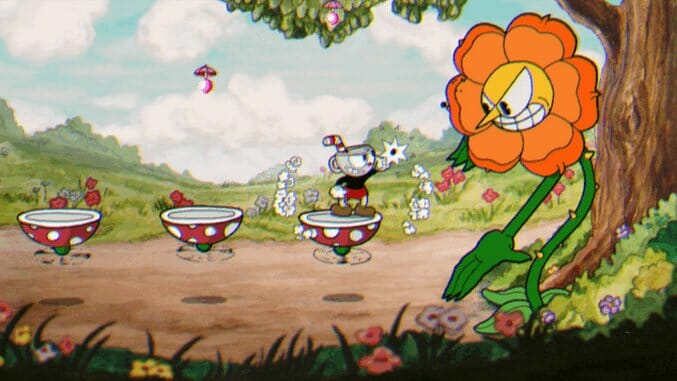
Can you ever judge a book by its cover? Conventional wisdom says no. Appearances can be deceiving and first impressions, after all, can be superficial and completely arbitrary. But what if the cover is the entire point? If there’s enough style, does there need to be substance?
Cuphead essentially lets you play through a cartoon from the 1930s, with the titular Cuphead and his brother Mugman shooting through a series of trials after they make a bad deal while gambling with the devil. It is a fascinating case study in the process of reverse engineering the tiny details and unique flourishes that comprise the look and feel of an entire decade, remarkably acting as “era porn” in a medium that lacks the history for it. A nostalgia-driven videogame is one that only has, at most, about four decades of inspiration to draw from. Like the retro-style pixel art titles that have come to dominate Steam, the visual style of Cuphead is one that pop culture abandoned as production techniques became more sophisticated. A cynic might say that with the passage of time, almost anything can look charming again. But Cuphead and its lovely vintage trappings remind us that the golden age of animation, all but faded from recent memory, has enduring genuine appeal.
Initially expected for a 2015 release, Cuphead underwent a few additional years of development due to complaints about its structure, which revolved around boss battles styled as vignettes, reminiscent of the cartoon shorts the game draws its material from. The boss battles remain, scattered across a map with four overworlds, but are now supplemented with platforming “run and gun” sections that place a high emphasis on timing, dashing and memorizing enemy movement patterns. Whether they are necessary is up for debate. Cuphead adequately does its job as a vehicle for the look and feel of 1930s animation, but the panic and speed of its run and gun levels are ill-suited for enjoying it.
In general, I struggle with the difficulty level of Cuphead. Players who enjoy the punishing action of the Mega Man series, for example, may adapt quickly to Cuphead’s demands on their skills, but I became fatigued and frustrated (two unaffordable conditions when working with a two-day review window). The controls are easy to learn and the response on each duck, dive and jump is immaculate. However the challenges within each level themselves don’t leave a lot of room for error. That is, of course, the point of a game in this particular genre. But it seems a shame that a game whose music, audio and animation were so clearly labored over, and so inviting and entrancing, tries so hard to not let players really immerse themselves in it.
It’s fitting that Cuphead reminds me of the cartoons I loved as a kid, because it requires the mindless patience, stubborn persistence and lack of anything better to do that personified my childhood. I enjoy the challenge, but the lack of steady progress is discouraging. If I’d had the option to quit or take a break, I probably would have stopped playing after the second boss and second run and gun level. That being said, out of sheer eagerness to see the rest of the worlds and levels, I still would have come back.
What defines a game: its mechanics, its story, its aesthetic? What would Cuphead be without the feel-good associations we thrust on a visual style based on our idealization of the past? Its upgradeable gun abilities and special powers (purchased, predictably, with the collection of gold coins) are nothing special; this type of action has been done a thousand times before. It provides entertainment, but does it drive the medium forward? Should it have to? I could get a similar skill-based experience from a random Flash game, but without the music and animation, it wouldn’t be as fun.
Ultimately the game provides too much nostalgic satisfaction for me to be upset by its conventions, no matter how punishing or familiar they may be. Style may not always offer substance, but in the case of Cuphead, I’m satisfied.
Cuphead was developed and published by StudioMDHR. Our review is based on the for the Xbox One. It is also available for PC.
Holly Green is the assistant editor of Paste Games and a reporter and semiprofessional photographer living in Seattle, WA. She is also the author of Fry Scores: An Unofficial Guide To Video Game Grub. You can find her work at Gamasutra, Polygon, Unwinnable, and other videogame news publications.